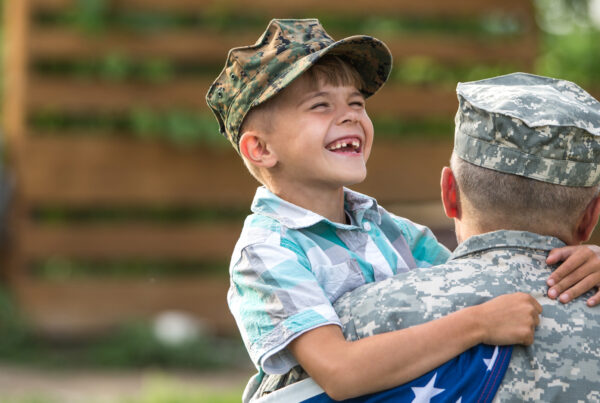With over 400,000 children and youth placed in the foster care system within the United States (more than 15,000 in New York State alone), foster care plays an essential role in providing temporary, safe and nurturing homes for children while their biological parents and family are unable to care for them.
Access to comprehensive, high quality health care is essential for these children, many of whom have higher rates of birth defects, developmental delays, mental and behavioral health needs, and physical disabilities than children and youth from similar socio-economic backgrounds outside of the foster care system. In addition, children and youth in foster care also have a high prevalence of usage of inpatient and outpatient mental health services, at a reported rate of 15 – 20 times higher than the general population.
The impact of the trauma they experienced is deep-rooted within the youth and families served in foster care, and it is therefore essential that there be immediate access to services upon a youth’s placement in foster care, with no interruption in the provision of services.
Article 29-I: an advancement in care
Beginning July 1, 2021, under NYS Public Health Law Article 29-I, New York State enrolled all its children and youth placed in foster care in Medicaid Managed Care. At the same time Voluntary Foster Care Agencies (VFCAs) statewide were given the opportunity to become a licensed health care facility provider through Article 29-I, by offering five Core Limited Health-Related Services (CLHRS).
The CLHRS services play a vital role in assuring that: all necessary services are provided in the specified time frames; the child and the child’s parents and caregivers are involved in the planning and support of treatment; information is shared appropriately among professionals involved in the child’s care; and all health-related information and documentation results in a comprehensive, individualized Person-Centered Treatment Plan.
CLHRS services include:
- A VFCA Medicaid Managed Care Liaison, who is responsible for ensuring a coordinated approach among the Medicaid Managed Care Plans, the 29-I Health Facility and the local departments of social services in order to monitor access to health care for children in foster care.
- A Clinical Consultant / Supervisor, who oversees and works with treatment providers to establish treatment goals, review all health care information and medical records, review and approve health forms, and communicate with caregivers including biological parents and foster parents.
- Nursing services that include providing intake assessments and routine screenings, as well as training and support in relation to developmental, medical, and psychiatric needs.
- A licensed behavioral health practitioner (LBHP), who helps establish treatment goals and provides counseling and clinical interventions.
- Lastly, there is a Medicaid Treatment / Discharge Planner who assists with medical appointments, as well as assuring the exchange of health information for treatment purposes, discharge planning and documentation.
With the addition of Article 29-I, VFCAs can also feel increased confidence in accepting referrals who require more intensive medical and mental health needs, knowing they will have these additional professionals as part of their treatment team.
A good fit
Not all VFCAs have elected to become Article 29-I providers. But with the growing need of accessible and comprehensive health care and mental health services within our own communities, KidsPeace FCCP knew that becoming a licensed health care facility was exactly what was needed to care for and assist the clients and families we serve, and to build upon the quality of treatment already being provided by our foster care team.
By 7/1/2021, each of the three KidsPeace New York foster care offices were providing CLHRS services outlined in Article 29-I. The services fill the existing gap between mental health and medical needs for each client within the voluntary foster care agency.
Treatment providers are able to work together with the KidsPeace foster care treatment team to reduce the severity of any identified needs, by arranging and/or providing targeted treatment and preventive supports through an array of services which are related directly to the child’s ability to successfully function within their home, school, and community environments.
The family connection
One key component of foster care is understanding the importance of the role biological family and kinship caregivers (those who may not be related by blood or marriage, but have a close relationship that is considered to be family), have in supporting family connections that are essential to a child’s health and well-being.
According to data derived from the Children’s Bureau, an Office of the Administration for Children and Families, when children cannot remain safely in their home, placement with relatives and kin — both formally through the child welfare system and informally through family arrangements — can increase stability, reduce trauma, and help children maintain a sense of family, belonging, and identity.
The inclusion of kin and extended family members in case planning expands placement and permanency options for children and youth when in-home care is not feasible. Maintaining relationships with relatives and kin can help provide a sense of belonging for young people in care.
In addition to bridging the gap among service providers, Article 29-I also bridges any gaps in contact and communication among the child’s biological parents, foster parents or kinship providers. By providing targeted services and communicating these needs with the child’s current and future caregivers, timely and effective discharge planning is provided throughout the entirety of the youth’s foster care placement.
By extending existing foster care supports and services with the addition of the 29-I health-related services, we are working towards strengthening the overall placement and discharge of the child or youth by ensuring timely service needs are provided from their first day of placement. In addition to building on their strengths through individualized treatment planning, the addition of services also work with those who care most about the child, including the foster parents, the family of origin and any potential kinship caregivers.
Conclusion
In less than a year’s time, KidsPeace and the clients and families whom they have served in the state of New York have greatly benefited by the addition of Article 29-I health-related services.
From being able to accept medically fragile client referrals with the addition of nursing services, to being able to provide timely safety planning with the addition of clinical supervision, to having a licensed health professional to coordinate individualized and person-centered treatment goals that include involvement and feedback from the child’s caregivers, and finally, having a discharge planner who is able to work with the child’s family or origin or other identified permanency option to ensure a successful discharge from foster care: the impact of the targeted teamwork has benefited not only the youth, but those whom are working with them and caring for them.
As the number of foster care referrals continue to rise in New York, so does the need for intrinsic coordination of services to both clients and families served. With the help of the 29-I program (as well as our other amazing community programs comprised of CFTSS and Health Homes), KidsPeace Foster Care is able to stay true to its core values of community, quality and excellence. By working together to establish a treatment team that addresses each and every need of the youth in placement, KidsPeace and other VFCAs are able to ensure that permanency, safety and well-being are made a priority from the day of enrollment until the day of discharge, and beyond.
KidsPeace is eager to witness the added benefits of these services and how they can continue to improve the quantity and quality of the current foster care services provided to clients and families. Through the use of a diverse multidisciplinary team, KidsPeace Foster Care and Community Programs can continue to work together to enhance the wellbeing and positive outcomes of the clients and families served by providing something each of us can benefit from: endless layers of support.






